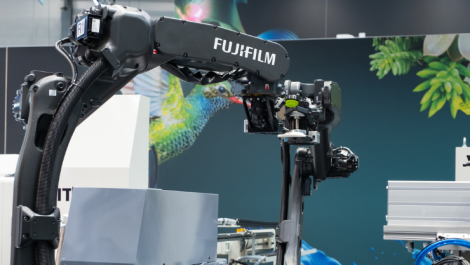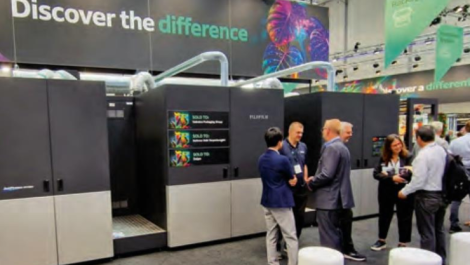With expectations high for lots of product launches over the coming months, as well as investment in and installation of new tools and systems introduced over the last 18 months, there is a lot of pressure on printers and converters and their finances.
Digital Labels & Packaging spoke with leading names in the industrial finance sector for their thoughts on the current climate and what can be done to alleviate financial burdens.
David Bunker, co-owner and director at Compass Business Finance, opens by stating that staying ahead of the competition has been cited as a cause for concern among UK businesses, along with inflation, taxation, and energy prices. ‘From a demand side point of view,’ he says, ‘uncertainty in the economy also provides pressures by generating unknowns in company’s production schedules and hence cash flow.
‘At a point in time when technology and innovation are progressing faster than ever, choosing the right investments and the timing for those can be a real challenge. This year printers and converters are going to be bombarded with new product launches and investment options for more advanced, efficient, and sustainable equipment, whilst at the same time, having to navigate a challenging and uncertain economic climate.’
Nick Aust, sales director within Close Brothers Asset Finance’s Print team, says, ‘The main financial pressure we are seeing within the industry remains that of cash flow management. The increase in energy and raw material costs has meant every business has had to evaluate debtor days and plan much more carefully than they once did. The effects of Covid are also still being felt with many businesses repaying debt they had little choice but to incur during the pandemic to keep trading.’
Such an operating environment makes it important for printers and converters to review and assess their finance options.
Mr Aust goes on, ‘It’s advisable for every company to regularly review how their business is financed and what options are available, regardless of size. Close Brothers Asset Finance is a relationship-based lender that commits time to talking about what options are available directly with the customer, and remains one of the only lenders where all underwriting decisions are made by people and not automated.
‘Cash release and consolidation of debt remain our most popular products, however, as the industry consolidates further, we are often being asked to look at options to assist with management buy-ins and buyouts, for which we have an array of products to facilitate.’
For Mr Bunker, ‘The big banks that have historically supported SMEs have become increasingly risk adverse, at a time when businesses need continued support. Challenger banks and independent lenders like us, have been able to take up some of this demand, an example of which is helping many businesses switch invoice finance facilities and providing much needed working capital.
‘Business strategies are becoming increasingly fluid, although the overall goals may remain constant, the journey has to be flexible, with regular reviews enabling management teams to be reactive to the ever-changing environment. Knowing your financial position, and the options that are available is key to the planning process, even where cashflow is good and balances are healthy, there are opportunities to do more. There are a huge variety of options available for raising finance, depending on the purpose, so it’s worth talking this through with your finance partners and accountant.’
Mr Bunker identifies how the British Business Bank’s recovery loan scheme has continued to provide support for business owners to make investments in new technology and replace aging machinery. Specifically, this post-Covid scheme provides accredited lenders with an 80% guarantee against losses, significantly helping businesses access funding when they might not otherwise have been able to. ‘We encourage companies to see what assisted funding could be possible whilst these schemes are still in operation,’ advises Mr Bunker.
Alongside advising the use of assisted funding options, Mr Bunker sees many printers and converters looking at cash raising exercises, such as refinancing of assets, invoice financing or other facets of asset-based lending, ‘in order to improve their monthly headroom and cash reserves’.
This, he suggests, is going on whilst they are also planning investment in new technology. ‘In fact, many discussions are bringing both of these areas together. Asset-based lending is continuing to grow in popularity, as it allows the delivery of more flexible finance packages that can be used either for significant investments, or mergers and acquisitions. We’re seeing a much higher number of businesses seeking growth through acquisition, and have assisted not only in funding these but also bringing the businesses together in the first instance.’
Given all of the aforementioned, how do Messrs Bunker and Aust see the rest of this year progressing and what impact will the economy have on businesses?
‘As the cost of funds continue to fall, we feel capex investment will increase as confidence returns in an unsure market,’ says Mr Aust. ‘Close Brothers Asset Finance remains committed to a flourishing and exciting market that we have serviced for over 40 years.’
Mr Bunker states, ‘Without a shadow of a doubt, 2024 is going to be another challenging year, with additional uncertainties arising from a potential change in government, coupled with wider macro-economic uncertainties. Yet for printers and converters, demand for evermore, sustainable, creative and innovative products continues to increase.
‘There are huge opportunities to succeed and grow, so long as we remain vigilant of the pitfalls. Looking beyond ourselves, being part of the wider print community and getting the most we can from this year’s key events is an important invitation for everyone.’
This article was first published in the January/February 2024 issue of Digital Labels & Packaging, which you can read online here






